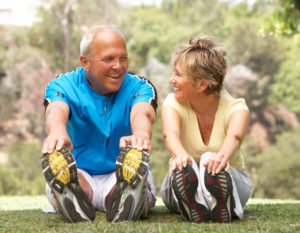
It doesn’t matter if you are a depressed teenager or an anxiety-ridden elderly patient; either way, exercise can help you fight depression without using a pharmaceutical cornucopia to treat your symptoms. Here are 4 reasons that exercise helps to keep you not just healthy, but happy:
1. Exercise Helps to Regulate Hormones
Increased use of pharmaceuticals and advancing age can lead to hormonal changes, further leading to anxiety and depression. Exercise helps to return these hormones to homeostatis. Qigong in particular has been shown to reduce depression in elderly patients. And teen patients can even reap the benefits of exercise to help keep cortisol and adrenaline levels in check while increasing seratonin, melatonin, and oxytocin.
Another review examining previous studies also affirmed that people who exercise are able to reduce the severity of their depression. The research came to us from the Cochrane Library.
2. Exercise Gives You more Energy
You’ve heard Newton’s first law – objects in motion tend to stay in motion. The reason we feel unmotivated when we’ve been negligent in exercising is because our respiratory and cardiovascular systems become depleted (as do all our other bodily systems) when we don’t move. Our cells don’t turn over as fast.
Toxins start to linger longer in our blood and digestive tract, and we start to feel tired and flat out cruddy. When we exercise, all our systems support this life-promoting activity by ‘turning on.’ This is part of the reason we experience an endorphin rush during and just after an exercise session. It is the body’s reward for doing something good for ourselves – and then we have the energy and motivation to do it again!
3. Exercise Builds Confidence
Who doesn’t feel better when they start to see their waistlines grow smaller, their skin begin to glow from the reduced toxicity in the body from sweating during exercise, and the general tone of their muscles improve? Exercise is a huge confidence booster. Even taking a brisk walk every day can increase your sense of accomplishment when things don’t seem to be going your way.
More vigorous exercise at least three times a week can help make your confidence soar. Many feel depressed because they feel powerless, but you can’t feel both confident and powerless at the same time.
4. Exercise Slows Aging
People who exercise usually feel at least five to ten years younger than their chronological age. They often look it, too. By exercising regularly you could potentially reduce your biological age by as much as 9 years when compared to your chronological age. The maximum reduction in age occurs when 3,500 to 6,500 calories are expended each week.
Depression can also trigger as we age, as the demands of life and its responsibilities mount. Low testosterone levels (in both men and women) can increase age-related depression, but exercise can help boost them. Not only does exercise make you feel and look younger, but it can actually reduce the stress that accompanies becoming an older adult.
5. Exercise Zaps Belly Fat.
It’s the easiest way to beat the bulge, period. “Regular moderate- to high-intensity aerobic exercise has the greatest impact on reducing ab fat — the dangerous fat that ups your risk of diabetes and heart disease,” says Olson. Exercise is the ultimate middle manager because it lowers levels of cortisol, a hormone that has been linked to ab fat. In fact, women with the most cortisol in their system have higher BMIs and bigger bellies than those with moderate amounts of the hormone, found a University of California at San Francisco study.
6. Exercise controls calories.
“It’s pretty simple: You need to burn more calories than you consume in order to lose weight,” says Nancy Snyderman, MD, a FITNESS advisory board member, editor-in-chief of BeWell.com, and chief medical editor for NBC news. Regular exercise blasts excess calories that would otherwise be stored as fat. “Plus, you continue to burn calories even in the hours following your workout,” says Dr. Snyderman.
BeWell.com
7. Exercise keeps lost pounds MIA.
“Ninety percent of people who have successfully lost weight and kept it off for a year do about an hour of physical activity a day,” says John Porcari, PhD, a FITNESS advisory board member and a professor of exercise and sports medicine at the University of Wisconsin-La Crosse. Exercise is even prescribed by docs for people who have undergone weight-loss surgery to help them hold onto their newly thin figures.
8. Exercise boosts metabolism.
Yes, you’ll lose fat when you diet without exercising, but you’ll also lose muscle, which means you’ll burn fewer calories. The more muscle you have, the higher your metabolism and the more calories you’ll torch.
9. Exercise trims inches.
The number on the scale doesn’t tell the whole truth, says FITNESS advisory board member Jari Love, a certified personal trainer and fitness DVD star: “When you shed fat and gain muscle you may lose inches and drop sizes without losing actual pounds.” For instance, if you gain 3 pounds of lean muscle and lose 4 pounds of fat, you’ve actually experienced a 7-pound improvement in your body condition, despite the scale only showing 1 pound of weight loss.
10. Exercise curbs emotional eating.
“Working out has been proven time and time again to help regulate mood, which has a direct effect on people who eat when they’re stressed or upset,” says Robert E. Thayer, PhD, a professor of psychology at California State University, Long Beach. Translation: When you’re already in your happy place you don’t need Ben & Jerry to lead the way.
11. Exercise creates a healthy chain reaction.
There’s a reason you find juice bars at the gym: “Healthy habits tend to cluster together,” says Boston-based psychologist Eric Endlich, PhD. “When people make positive changes, like getting more exercise, they tend to work on other health improvements as well, such as eating better.” The result? Weight loss.
12. Exercise brings on the fun.
Let’s face it: Rock-climbing is way more exciting than eating a celery stick. That’s why it’s easier to be active to stay slim than to maintain a strict diet. “If you look at people who incorporate exercise successfully in their lives, they’ve found something they truly enjoy,” says Dr. Snyderman.
13. Exercise stops hunger.
People who exercise and diet are actually less hungry than those who only diet, according to a study in the journal Obesity. Bonus: Your self-restraint is higher, too.
14. Exercise ups energy.
Regular physical activity increases stamina by boosting the body’s production of energy-promoting neurotransmitters, studies show. That pep gives you even more motivation to get moving and shed pounds. When was the last time diet alone did all that?
Source: fitnessmagazine.com











Leave a Reply